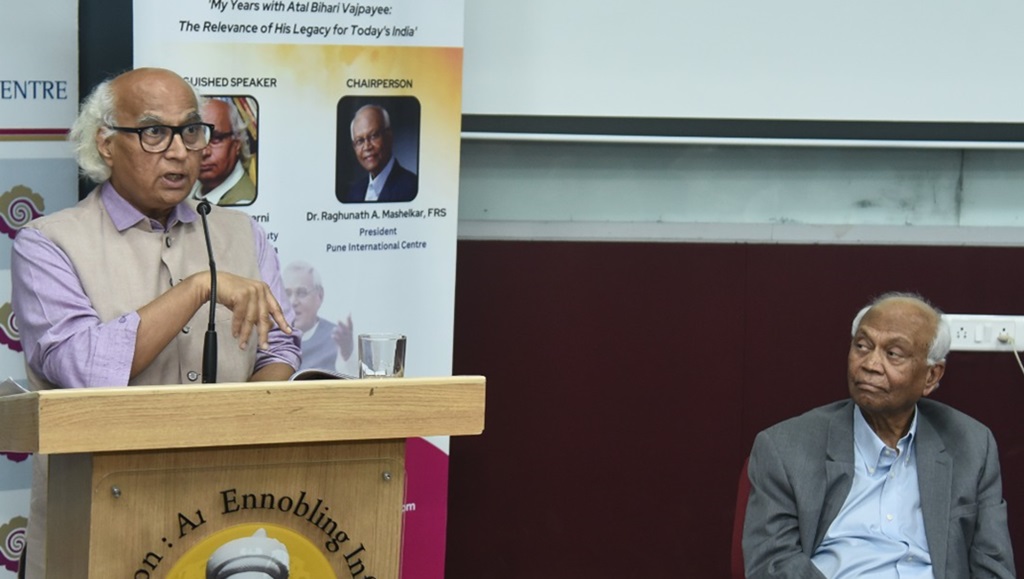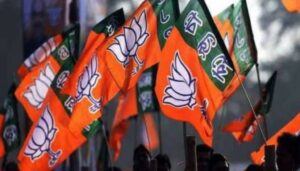Vajpayee’s Vision: Dr. Sudheendra Kulkarni Discusses His Impact on India’s Future

Pune, 21st October 2024: Atal Bihari Vajpayee was a “great son of India,” a “quintessential democrat,” and “one of the great prime ministers of the country,” said Dr. Sudheendra Kulkarni, who served as Officer on Special Duty in the Prime Minister’s Office during Vajpayee’s tenure. He was speaking at PIC’s 4th Atal Bihari Vajpayee Birth Centenary Lecture in Pune on Saturday (Oct 19).
Reflecting on Vajpayee’s enduring legacy, Dr. Kulkarni highlighted the present and future relevance of Vajpayee across four key areas: democracy, secularism, India-Pakistan relations, and the India-China dispute.
Dr. Kulkarni stated that the former Prime Minister was a democrat who believed that democracy demanded cooperation and not confrontation. He noted that “Coalition Dharma” was Vajpayee’s contribution to the Indian political lexicon. He emphasized that Vajpayee strived to build harmonious Centre-state relations by institutionalizing Centre-state consultations, advocated for meaningful parliamentary debate, and welcomed suggestions from opponents, earning their respect and admiration.
Dr. Kulkarni remarked that Vajpayee was a staunch Hindu who stood for “positive secularism” and believed in taking every section of society along. He stated that for Vajpayee, Raj Dharma meant that no section of society should feel alienated.
Recounting Vajpayee’s pioneering efforts to normalize ties with Pakistan, including his historic Lahore bus yatra, of which Dr. Kulkarni was a part, he noted that despite setbacks such as the Kargil War, Vajpayee was undeterred in pursuing dialogue, believing that war would be suicidal for both nations. He highlighted that Vajpayee’s approach to solving the Kashmir issue was rooted in consultation and the spirit of ‘insaaniyat’ (humanism), earning him the trust of Kashmiris. Dr. Kulkarni recalled Vajpayee’s statement that he would have solved the Kashmir issue once and for all if he had one more term.
He pointed out that the current leadership has a unique opportunity to build on Vajpayee’s groundwork for a peaceful resolution of the border dispute with China. Emphasizing Vajpayee’s strategic vision as Minister of External Affairs in the Morarji Desai government (1977-79), he mentioned his proposal for a “packaged solution” to the dispute. He noted that during Vajpayee’s tenure as Prime Minister, both countries had agreed to engage in dialogue through appointed representatives to find a permanent solution to the border dispute.
On the relevance of Vajpayee’s principles for India’s future, even in the post-Modi era, Dr. Kulkarni stated that India cannot deviate too much from the path followed by Vajpayee and Jawaharlal Nehru. While acknowledging that PM Modi has provided India with a long-term vision to become a developed nation by 2047 in Amrit Kaal, he emphasized that India must take the lead in creating a more integrated South Asia.
In his welcome address, PIC President Dr. Raghunath Mashelkar, a member of the PM’s National Innovation Council during the Vajpayee government, highlighted Vajpayee’s contributions to highway development, IT and telecom, and his efforts to foster emotional, political, diasporic, and neighborhood connectivity. Dr. Mashelkar also introduced Dr. Kulkarni’s book Music of the Spinning Wheel: Mahatma Gandhi’s Manifesto for the Internet Age to the audience. Mr. Abhay Vaidya, Director of PIC, delivered the opening remarks. PIC books were presented to Dr. Kulkarni at the event.






